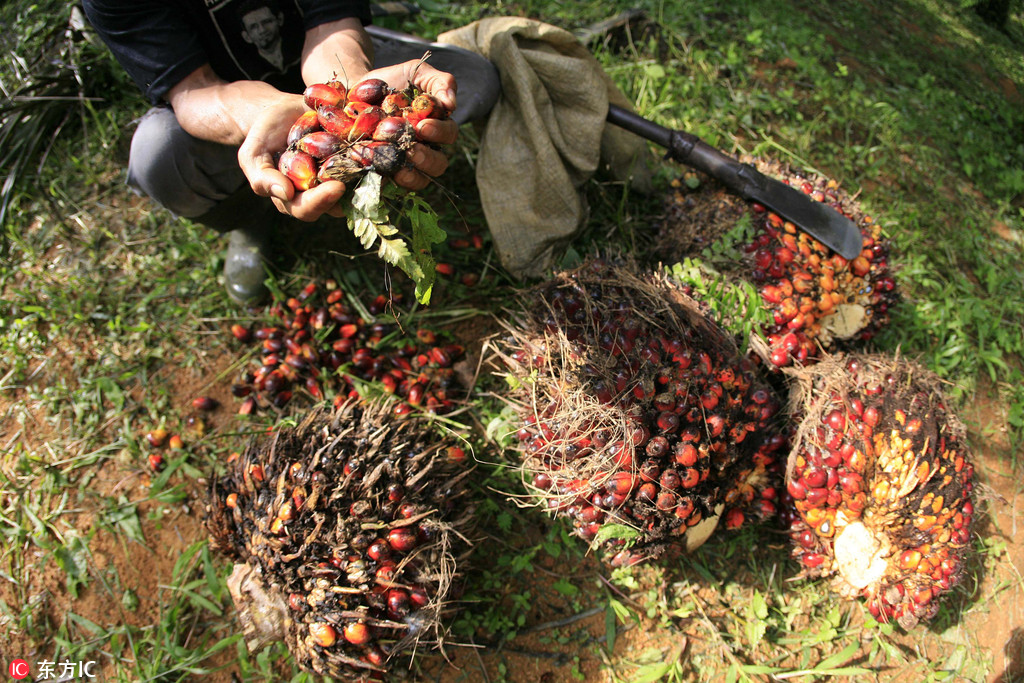Palm oil exporters in potential dispute


Malaysian PM slams 'unfair' plan of EU, warns of backlash across Southeast Asia
Palm oil, one of Southeast Asia's key cash crops, may trigger a possible trade dispute between the European Union and Indonesia and Malaysia.
Top palm oil exporters Indonesia and Malaysia have threatened to boycott European products and file a case at the World Trade Organization in response to the EU's plan to ban the use of palm oil in renewable transport fuel.
The EU is said to be phasing out palm oil from its biofuel sector in favor of other vegetable oils as part of the its Renewable Energy Directive (RED II).
The bloc is the second-biggest market for both Malaysian and Indonesian palm oil, accounting for more than 11 percent of Malaysia's and 15 percent of Indonesia's annual exports.
Malaysian Prime Minister Mahathir Mohamad maintained that the EU's plan was unfair and would lead to a backlash across Southeast Asia. Malaysian Primary Industries Minister Teresa Kok will lead a mission to Belgium in May to negotiate with EU leaders.
The Indonesian government said it would challenge the EU at the WTO as soon as the rules take effect, according to Indonesia's Economic Affairs Minister Darmin Nasution.
Togar Sitanggang, deputy chairman of the Indonesian Palm Oil Association, also known as GAPKI, said his group supports the government's move to refer the case to the WTO. "We are very serious (on filing a case at the) WTO," he said.
Sitanggang said that the GAPKI has consulted lawyers and he is confident that Indonesia has a strong case as the EU's plan against palm oil is "really discriminatory" and will penalize the millions of small farmers who depend on palm cultivation.
"Palm oil is not just a big corporate business. It's also a farmer's business," he said.
"An argument in the WTO is inevitable," said Khor Yu Leng, an independent Kuala Lumpur-based consultant on sustainable supply chain and trade.
Khor, a former regional research head at global agribusiness consultancy firm LMC International, expects both Malaysia and Indonesia to be firm on their position given the huge impact of the industry on the two countries' economies.
Indonesia and Malaysia account for 85 percent of global palm oil supply. In 2018 alone, their combined shipments exceeded 50 million tons, according to data issued by the Malaysian Palm Oil Council and GAPKI.
Palm oil is the most widely used vegetable oil in the world and a key ingredient in most food products, toiletries and cosmetics.
The high demand for palm oil may have contributed to the rapid expansion of palm plantations, with producers clearing forests to cultivate more palm trees, raising concerns over the habitats of endangered animals such as orangutans and Sumatran tigers.
The Indonesian and Malaysian governments and industry players have moved to address these concerns by introducing sustainably produced palm oil.
Both countries are part of the Roundtable on Sustainable Palm Oil - a global certification scheme that sets the standard for a more eco-friendly palm oil production. Indonesian and Malaysian officials have likewise halted the issuance of permits for new palm plantations to maintain forest cover.
Sustainable supply-chain consultant Khor said that while a certification scheme is "a good mechanism" to promote a more environment-friendly farm production, this might not be enough for importing countries like the EU. This is because a certification scheme usually covers a limited amount of farm lands.
But she said that Indonesia and Malaysia may still get exemptions from the EU's planned phaseout of palm oil.
RED II exempts palm oil produced in independent small plantations. Khor said with this provision, palm oil produced by small farmers can still be used in EU's biofuels.
Given the uncertainty over palm oil exports to the EU, Indonesia and Malaysia are also considering moves to diversify their markets.
"Malaysia and Indonesia will have to seriously consider diversifying their commodity exports and move up the value chain," said Oh Ei Sun, a senior fellow with the Singapore Institute of International Affairs.
































